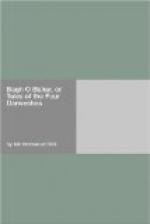But first this guilty being, Mir Amman, of Dilli, begs to relate his own story: “That my forefathers, from the time of King Humayun, served every king, in regular descent, with zeal and fidelity; and they [21] also (i.e. the kings), with the eye of protection, ever justly appreciated and rewarded our services. Jagirs, titles and rewards, were plentifully bestowed on us; and we were called hereditary [22] vassals, and old servants; so that these epithets were enrolled in the royal archives. [23] When such a family (owing to which all other families were prosperous) dwindled to such a point! which is too well [24] known to require mention, then Suraj Mal, the Jat, [25] confiscated our Jagir, and Ahmad Shah the Durrani, [26] pillaged our home. Having sustained such various misfortunes, I abandoned that city, which was my native land, and the place of my birth. Such a vessel, whose pilot was such a king, was wrecked; and I began to sink in the sea of destitution! a drowning person catches at a straw, and I sustained life for some years in the city of ’Azim-abad, [27] experiencing both good and bad fortune there. At length I left it also—the times were not propitious; leaving my family there, I embarked alone in a boat, and came in quest of a livelihood [28] to Calcutta, the chief of cities. I remained unemployed for some time, when it happened that Nawwab Dilawar Jang sent for me, and appointed me tutor to his younger brother, Mir Muhammad Kazim Khan. I stayed with him nearly two years; but saw not my advantage [in remaining there any longer.] Then, through the assistance of Mir Bahadur ’Ali Munshi, I was introduced to Mr. John Gilchrist (may his dignity be lasting.) At last, by the aid of good fortune, I have acquired the protection of so liberal a person, that I hope better days; if not, even, this is so much gain, that I have bread to eat, and having stretched my feet, I repose in quiet; and that ten persons in my family, old and young, are fed; and bless that patron. May God accept [their prayers!]
“The account of the Urdu tongue I have thus heard from my ancestors;—that the city of Dilli, according to the opinion of the Hindus, was founded in the earliest times, [29] and that their Rajas and subjects lived there from the remotest antiquity, and spoke their own peculiar Bhakha. [30] For a thousand years past, the Musalmans have been masters there. Mahmud of Ghazni [31] came [there first]; then the Ghori and Lodi [32] became kings; owing to this intercourse, the languages of the Hindus and Musalmans were partially blended together. At last Amir Taimur [33] (in whose family the name and empire remain to this day), conquered Hindustan. From his coming and stay, the bazar of his camp was settled in the city; for which reason the bazar of the city was called Urdu. [34] Then King Humayun, annoyed by the Pathans, went abroad [to Persia]; and at last, returning from thence, he punished the surviving [Pathans], and no rebel remained to raise strife or disturbance.




